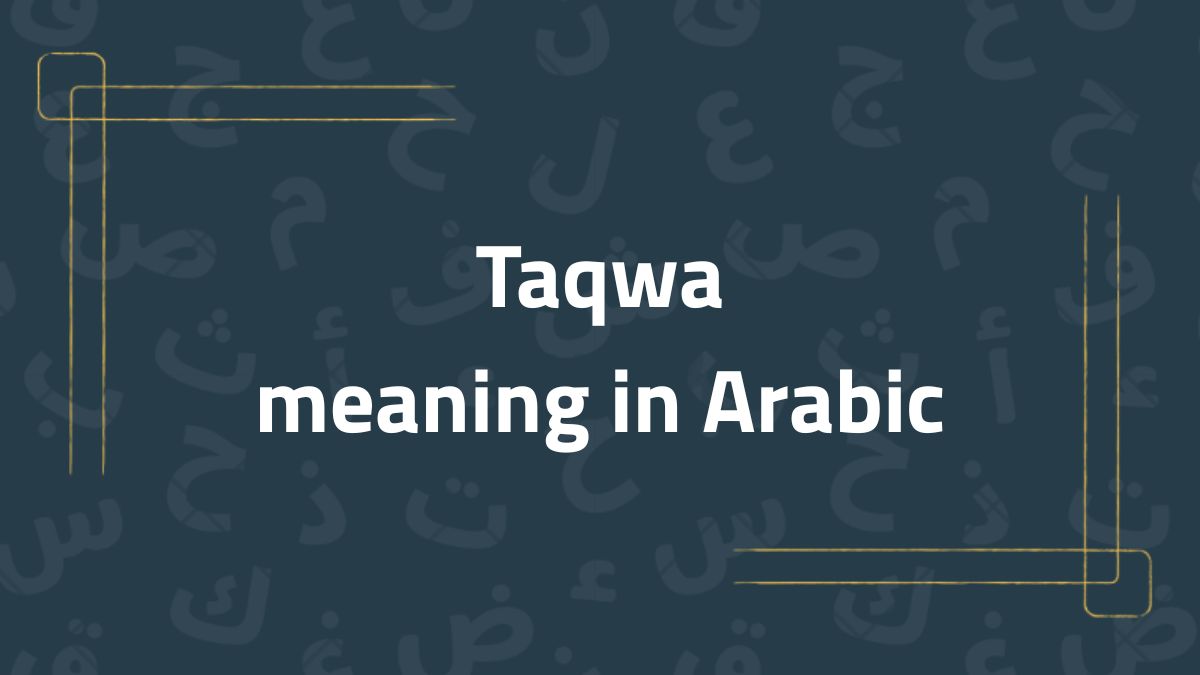The Word Taqwa Meaning in Arabic With Examples

The Arabic word “taqwa” holds deep significance in both language and Islamic teachings. It appears frequently in the Quran and daily conversations among Arabic speakers. This article explains the meaning of “taqwa,” its linguistic roots, Quranic importance, and usage in sentences.
By the end, you will understand why this word is essential for Arabic learners.
The Meaning of “Taqwa” in Arabic
“Taqwa” (تَقْوَى) translates to “piety,” “God-consciousness,” or “fear of Allah.” It describes a state of mindfulness where a person avoids sin and obeys Allah’s commands. The pronunciation is “taq-wa,” with emphasis on the first syllable.
Linguistic Root and Grammatical Usage
The root of “taqwa” comes from the Arabic letters “Waw-Qaf-Ya” (و-ق-ي), which relate to protection and guarding. The word is a noun (ism) derived from the verb “ittaqā” (اتَّقَى), meaning “to fear Allah” or “to be cautious.”
Grammatically, “taqwa” does not change much in sentences because it is a noun. However, related verb forms include:
-
Yattaqi (يَتَّقِي) – “He fears Allah.”
-
Ittaqū (اتَّقُوا) – “Fear Allah” (command).
Examples of “Taqwa” in Arabic Sentences
-
التقوى هي خير زاد
“Taqwa is the best provision.”
(This is a common Islamic saying.) -
يجب أن نتحلى بالتقوى في كل أعمالنا
“We must have taqwa in all our actions.” -
التقوى تمنع الإنسان من ارتكاب الذنوب
“Taqwa prevents a person from committing sins.”
Cultural or Quranic Significance of “Taqwa”
“Taqwa” is a key concept in the Quran. Allah frequently mentions it, urging believers to practice it. For example:
-
Surah Al-Baqarah (2:197):
“And take provisions, but indeed, the best provision is taqwa.” -
Surah Al-Hujurat (49:13):
“Indeed, the most noble of you in the sight of Allah is the most righteous (who has taqwa).”
In Islamic teachings, “taqwa” is not just fear but a deep awareness of Allah in every action.
Common Misunderstandings or Mistakes
Some learners confuse “taqwa” with:
-
“Khauf” (خوف) – Means general fear, not specifically God-consciousness.
-
“Tawakkul” (توكل) – Means trust in Allah, not the same as taqwa.
Another mistake is thinking “taqwa” only means fear. While it includes fear of Allah, it also means love and obedience.
Why You Should Learn “Taqwa”
Understanding “taqwa” helps in:
-
Reading the Quran with better comprehension.
-
Engaging in Islamic discussions.
-
Improving moral behavior by applying its meaning.
For Arabic learners, mastering words like “taqwa” deepens both language and spiritual knowledge.
Conclusion
“Taqwa” is a powerful Arabic word meaning God-consciousness and piety. It comes from the root “Waw-Qaf-Ya” and is central to Islamic teachings. The Quran emphasizes its importance, and Muslims strive to practice it daily. By learning “taqwa,” you gain insight into Arabic language and Islamic values. Whether for Quranic study or daily conversation, this word is essential for every learner.
Discover the Quran and Arabic with Shaykhi Academy
We highly recommend Shaykhi Academy for anyone seeking to learn the Quran and Arabic with excellence. The academy is known for combining expert teaching with a compassionate approach, making it a top choice for students worldwide who want to connect deeply with the words of Allah.
At Shaykhi Academy, you’ll find highly qualified teachers who specialize in guiding learners of all ages and levels. Whether you’re just beginning your journey with Arabic letters or aiming to master Tajweed and Quran recitation, their personalized lessons ensure steady progress at your own pace.
With engaging classes, flexible scheduling, and a focus on both spiritual and linguistic growth, Shaykhi Academy makes learning both enjoyable and impactful.
Watch a sample class below to see Shaykhi Academy in action:
Learn Arabic, Quran, And Tajweed With Free Trial!
Make your home a place of faith, understanding, and connection with the Quran. Whether you're starting from scratch or deepening your knowledge, Shaykhi Academy is here to guide you — step by step. ✅ Tailored for all ages ✅ Clear, structured learning ✅ Flexible online sessions ✅ Book your free trial session now!
Learn More
